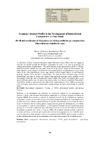Identificador persistente para citar o vincular este elemento:
https://accedacris.ulpgc.es/jspui/handle/10553/37147
| Título: | Erasmus+ Student Profile in the Development of Intercultural Competence: A Case Study | Otros títulos: | Perfil del estudiante de Erasmus+ en el desarrollo de su competencia intercultural: estudio de caso | Autores/as: | Alfonzo de Tovar, Isabel Cristina Caceres Lorenzo, M-Teresa Santana Alvarado, Yaiza |
Clasificación UNESCO: | 5901 Relaciones internacionales 58 Pedagogía |
Palabras clave: | Intercultural competence Erasmus + EHEA Intercultural profile Intercultural learning, et al. |
Fecha de publicación: | 2017 | Publicación seriada: | RAEL. Revista electrónica de lingüística aplicada | Resumen: | As university lecturers within the European Higher Education Area (EHEA) who also engage in research, we should evaluate the Erasmus+ programme in terms of its role in promoting the cultural development of participants. This article focuses on the assessment of the IC of 60 nonSpanish Erasmus+ students in a case study at the University of Las Palmas de Gran Canaria. The main objective of this article is to define the intercultural profiles of participants in a case study based on the following different factors (age, gender, mother tongue, degree of multilinguism, mobility, academic level and field of knowledge). The study has been designed using a mixed methodology and aims to collect and analyze data gathered regarding actors included in the intercultural model devised by Fantini and Tirmizi (2006). The results we obtained allow us to specify different profiles and the factors that directly affect how they are classified. This study's contribution should be understood in the light of the implementation of the EHEA, an area that aims to promote intercultural communication among students as future
professionals in a global world. Erasmus+ es un instrumento que promueve el crecimiento cultural de los participantes que debemos evaluar como docentes investigadores implicados en el Espacio Europeo de Educación Superior (EEES). Este artículo se centra en la valoración de la CI de 60 estudiantes no españoles de Erasmus+ a través de un estudio de caso en la Universidad de Las Palmas de Gran Canaria. Este artículo tiene como objetivo general delimitar los perfiles interculturales de un estudio de caso a través de diferentes factores (edad, género, lengua materna, grado de plurilingüismo, movilidad, nivel académico y rama de conocimiento). La investigación diseñada con una metodología mixta persigue la recolección y análisis de datos obtenidos a través de los factores incluidos en el modelo intercultural propuesto por Fantini y Tirmizi (2006). El resultado obtenido permite especificar diferentes perfiles y los factores que inciden directamente en las agrupaciones. La contribución de esta investigación se debe entender a la luz de la implantación del EEES, espacio en que se solicita la intercomunicación cultural de los estudiantes como futuros profesionales de un mundo global. |
URI: | https://accedacris.ulpgc.es/handle/10553/37147 | ISSN: | 1885-9089 | Fuente: | RAEL. Revista electrónica de lingüística aplicada [ISSN 1885-9089], v. 16 (1), p. 103-117 |
| Colección: | Artículos |
Visitas
299
actualizado el 15-ene-2026
Descargas
195
actualizado el 15-ene-2026
Google ScholarTM
Verifica
Comparte
Exporta metadatos
Los elementos en ULPGC accedaCRIS están protegidos por derechos de autor con todos los derechos reservados, a menos que se indique lo contrario.
